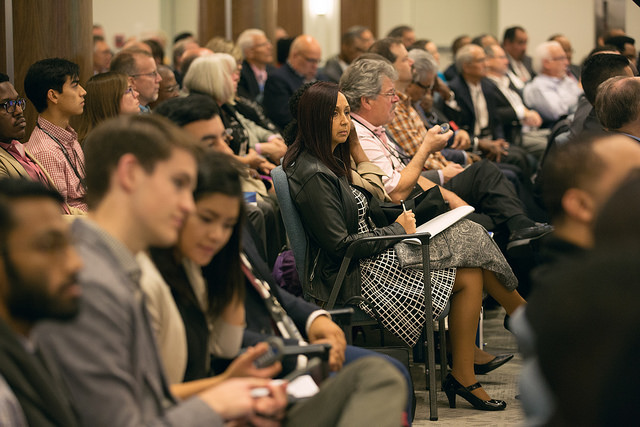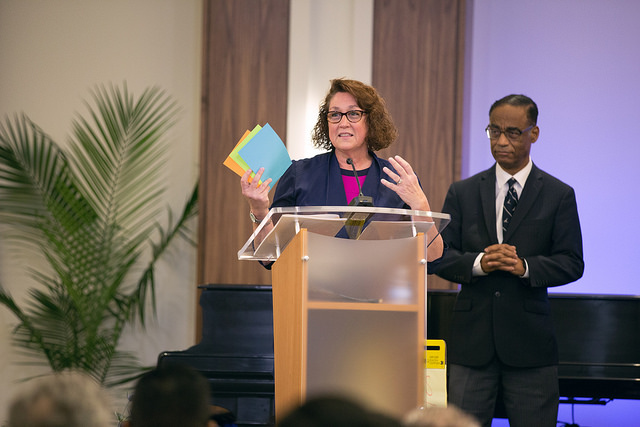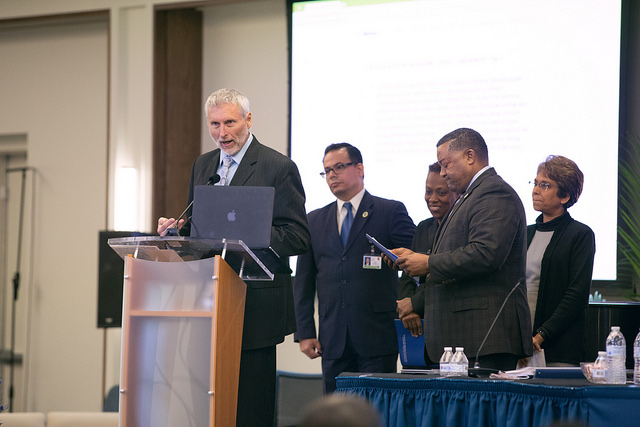While church business filled most of the morning and early afternoon on Oct. 27, 2017, the second day of the 2017 North American Division (NAD) Year-End Meeting started and ended with a spirit of worship and gratefulness toward God and His leading.
Morning worship featured an interview with Pastor Charles E. Bradford and Ethel Bradford, conducted by NAD Communication associate director Julio Muñoz. The Bradfords talked about their courtship and 70 years of marriage and ministry.

Photo by Pieter Damsteegt
Bradford, the first NAD president, spoke passionately about the local church. He said, "Everything is contained in the small little egg of the [local] church. Love those people, respect them, know how to talk to them!" Bradford added, “Don't think the early church was perfect ... The church is made up of human individuals. But God is working with us”
The Friday evening vespers, hosted by Kenneth Denslow, assistant to the division president, and Jose Cortes Jr., an associate director of the Ministerial Association, included prayer; congregational singing; and videos and Q&A with pastors, lay leaders, and conference and union officials from across North America on ministry and mission in their churches and local areas. From evangelistic meetings to community baby showers, from revitalizing church through new mission statements to comforting victims of violence, from starting church plants to opening up the first blind church in the division, each presentation elucidated stories showing the ways that God transforms lives.
Matt and Amy Stockdale, lay leaders from North Carolina who have planted one church and are preparing to plant another in the Greensboro area, summed up the evening when they talked about listening to God and letting the Holy Spirit lead. The married couple, both attorneys, said, “If we can do it, anyone can!”

Sharon Aka and Paul Brantley take about strategic approach to mission. Photo by Pieter Damsteegt
Strategic Visioning
The business session included a strategic visioning report from Paul Brantley, NAD vice president for Strategic Planning and Assessment, and an exercise in which executive committee members voted on what is understood about our church in regard to mission awareness, alignment, and accountability. After this, delegates were encouraged to write their thoughts and ideas on large yellow post-it notes in the NAD’s atrium. Sharon Aka, associate director of the Adventist Learning Center, facilitated this process.
Taking Steps to Others
Pacific Press Publishing Association’s president Dale Galusha, with NAD president Daniel R. Jackson, introduced the initiative “Taking Steps,” a reference to sharing Ellen G. White’s book Steps to Christ across the division. Jackson asks delegates to vote later during the YEM on which cover they like best, depicted in an introductory booklet handed out at the meeting. He asked for those gathered to pray about it, asking, “Is this something we can do across the entire division? Share this with our friends who don’t know Jesus?”
Adventist Risk Management
Tim Northrop, Adventist Risk Management’s president, described the new “Ascend to Wholeness” health care plan — an integrated, comprehensive care coordination and wellness plan the church voted on this past year. About 30 minutes of discussion ensued on the new plan and claims.
Before Northrop shared his report, Jackson reiterated that churches, schools, and other entities should not use 15-passenger vans, citing that the vans’ narrow wheel bases are causing accidents and deaths, and costing the church millions of dollars.

Members of the NAD Ministerial Association team give their report on Oct. 27, 2017, during the second day of YEM. Photo by Pieter Damsteegt
Ministerial Association
Ministerial Association gave their report next. Five members of the team spoke. First up after introductory words from Ivan Williams, Ministerial Association director, Dave Gemmell, an associate director, explained adjustments to continuing education. He shared that the updated policy has only 391 words.
Esther Knott, an associate director, explained what activities pastors can be involved in for continuing education credits, presenting a booklet on the requirements. This information is also available online.
Jose Cortes Jr. spoke on church planting and mentoring leaders. He said, “Pastors alone cannot do the work, we need some help.” He described how volunteer laypastors can help fill in the gaps. “It’s all about kingdom growth. If church planting will continue, it cannot be with pastors alone.”
Training has started for laypastors, said Cortes. “This is not to replace ministers, this is a way to help ministers,” Cortes said. He shared how after laypastor training, the New Jersey Conference planted 29 churches.
Brenda Billingy, an associate director, said that women ministers need to be involved. She stated that since the Women in Ministry initiative began just a few years ago, there have been 50 new hires in 30 conferences—and eight unions are signed up for the Women in Ministry initiative. “Mentoring, supporting, and collaborating is important for female clergy,” said Billingy. “This was accomplished by the women pastors and chaplains retreat last year.” She explained that attendees asked the division to repeat the event every other year, announcing that the next conference will be held in Palm Springs, California, on Sept. 2-5, 2018.
Williams wrapped up the report by thanking God for the more than 4,400 credentialed ministers in the NAD. He urged young people sensing God’s call to consider pastoral work; and he shared that the next CALLED convention will be on June 21-24, 2020, in Lexington, Kentucky. The Ministerial Association report ended with a video.
Youth and Young Adult Sabbath School
As they presented together, Tracy Wood, Armando Miranda, and Sherry Uhrig described the gap in Sabbath school as one reason youth and young adults disconnect from church.
Sherry Uhrig, Children’s Ministries director, explained how the Z Generation, ages 8-12, more than any other “are ready and willing to give their lives to Jesus.” She added that they embody the statement “I must be about my Father’s business.”
Uhrig said, “Sabbath school is the best hour of the Sabbath service, … the sermon is just the cherry on top.”
Miranda, Youth and Young Adult associate director, talked about meetings held in February that addressed the Youth Sabbath School challenge. Miranda said, “It’s easier to build strong children than to repair broken [adults].”
Wood, director of Youth and Young Adult Ministries, said that Children’s Ministries is the foundation for Sabbath school, but this is not the case for youth, which is an orphan with little resources and training available. Wood also said the NAD wants to draw the millennials back to Sabbath School through their kids attending. “Children’s Sabbath school is really young adult ministry.” The parents want practical help, mentors, and family ministries.
“Let’s repurpose, refocus, and reshape, re-conceptualize youth ministries — the junior high age group,” said Wood. “We [need] to redefine the ministry portfolio, not add another ministry.”
“Training is a key to this,” said Uhrig. Explaining that Children’s Ministries has eight training tracks with 10 different classes.
Miranda shared that next week a digital platform called “Insights,” on social media and a website, will provide some content for teens. He hopes this leads to more content for teachers in schools and Sabbath schools.
Delegates asked questions and commented on the concerns for youth brought to the floor in the report. One delegate suggested that Youth Ministries “include young adults in the refocusing and restructuring of youth Sabbath school.”
There was agreement on the platform and around the room. Said Uhrig, “There’s no doubt that the Holy Spirit is working on the hearts of our children. He is calling to them and they are hearing His call. They will embrace what’s on His heart, and let it become their heart.”
